
Controversial Anti-Islam Bus Ads Running in Philadelphia
- By Alison Lesley --
- 18 Apr 2015 --

A highly controversial anti-Islam bus ad on SEPTA in Philadelphia has attracted international attention and condemnation of gargantuan proportions.
The advert that is causing so much tension, which has been warned to leave the doors open to possible “confrontation and clashes” from the Muslim community features a picture of Haj Amin al-Husseini, a Muslim Palestinian nationalist leader during the 1920s and 1930s whom the ad labels “the leader of the Muslim world,” having a meeting with Adolf Hitler. The ad carries a heading “Islamic Jew-Hatred: It’s in the Quran,” with a message urging the world to end “aid to all Islamic countries.”
The ad campaign which appears to want to tag Islam as a religion that justifies and promotes religious intolerance against Jews, is currently featured on the sides of 84 SEPTA public transportation buses, and these ads are expected to run until the end of April.
An ad similar to this had previously run in other U.S. cities, including San Francisco, Washington, D.C., and New York before making its way to “the City of Brotherly Love.”
The controversial ad campaign was launched and funded by a political blogger, Pam Geller, of the American Freedom Defense Initiative (AFDI), a report on IB Times says. The AFDI is a group that Southern Poverty Law Center has listed as an anti-Muslim hate group.
The AFDI organization which is based in New Hampshire, spent about $30,000 to push this ad, despite initial resistance from Philadelphia’s transport authority to accept the campaign – a case they lost to AFDI in court.
Angry reactions, both domestically and internationally, have followed the ad campaign since its launch, as many have seen the message passed by the campaign as very racist.
Reacting to the advert, Imam Mikal Shabazz, of the Philadelphia-based Masjidullah, says the ad is everything but true. In a Philly online publication, he believes that although the advert was designed with evil intentions and expectations, the positive results it will usher in might far outweigh its planned intent.
“If nothing else, rather than dividing us, [the anti-Islam ad campaign] has brought us together,” Shabazz said.
Also, a rally was carried out last month in Love Park against the ad campaign. The rally was attended by Mayor Nutter and various people across different faiths, to register their displeasure over the campaign. It was followed up with another rally and press conference on April 3, at the Masjidullah Center for Human Excellence at West Oak Lane.
Dwight Evans, the newly appointed State Representative on the SEPTA board of directors, expressed his grief over the federal judge ruling that ordered SEPTA to run the controversial ad campaign.
In a statement made available on Philly.Com, he said “this is my district and I wanted to join you and send the message that Muslims should not be attacked because of their religious beliefs. No single religion should be focused on or charged with this.”
“The message we’re sending is very empathetic, you attack one of us, you attack all of us,” Evans added.
On the international scene, the most remarkable backlash the Islam-bashing ad has received is from Dar al-Ifta, who the most prominent religious authority in a Muslim-majority Egypt.
https://twitter.com/akkasistan/status/576345500921757696
The Egyptian religious authority had issued a Fatwa (non-binding legal opinions issued by scholars) via its website condemning the campaign on the premise that it not only depicted Islam in the wrong light, but also promotes prejudice, hatred and conflict in the U.S., a statement posted on the institution’s website said.
“This hazardous campaign will leave the gate of confrontation and clashes wide open instead of exerting efforts toward peaceful coexistence and harmony,” the authority warned.




















